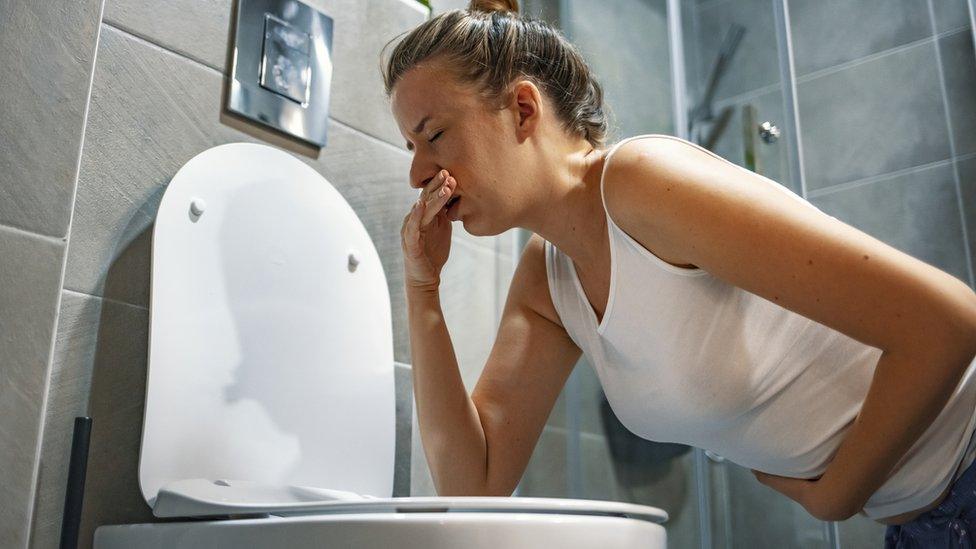Winter vomiting virus warning for England
- Published
- comments

England is experiencing an unseasonable rise in winter vomiting virus, officials are warning.
Public Health England, external (PHE) says 154 norovirus outbreaks have been reported in the last five weeks, compared to an average of 53 over the same time period in the previous five years.
Most have been in educational settings, particularly in nurseries.
Cases are returning to pre-pandemic levels across all age groups and settings and people should be on alert.
Symptoms include sudden, projectile vomiting and diarrhoea.
It is very contagious - people sick with it can shed billions of norovirus particles. It only takes a few of these virus particles to infect others.
Prof Saheer Gharbia from PHE said: "Norovirus, commonly known as the winter vomiting bug, has been at lower levels than normal throughout the pandemic with less opportunity to spread between people in the community but as restrictions have eased we have seen an increase in cases across all age groups."
Norovirus facts
It spreads through direct contact with others who have it or contaminated surfaces
It may be extremely unpleasant, but usually goes away in about two days
You can usually treat it at home, with rest and lots of fluids to avoid dehydration
PHE says it is possible that unusual or more out-of-season increases could be seen in the coming months following further easing of Covid control measures. A similar pattern was seen in Australia, external when it relaxed some restrictions.
In Scotland, reported cases are currently below the five year average for summer months, external.
If you or a child has norovirus, the advice is to stay at home. Do not return to work or send children to school until 48 hours after symptoms have cleared.
Avoid visiting your GP but if you are concerned, particularly about a young child or baby with symptoms, do contact NHS 111 or talk to your GP by phone, says PHE.
The officials say they will continue to closely monitor the situation. And they say there are practical things you can do to reduce your risk of catching and spreading it:
Wash your hands frequently and thoroughly with soap and warm water. Unlike for Covid, alcohol gels do not kill off norovirus
Bleach in water does work to clean contaminated surfaces, such as toilets and taps
If you are ill, avoid cooking and helping prepare meals for others until 48 hours after symptoms have stopped, to avoid passing the infection on
Wash any contaminated clothing or bedding using detergent and at 60°C, and if possible, wear disposable gloves to handle contaminated items
Symptoms, which can include a high temperature, abdominal pain and aching limbs as well as vomiting, appear one to two days after people become infected.
People can pass on norovirus or shed the virus during this period but are most infectious when they have symptoms.
Outbreaks have been known to affect hospitals and care homes too. Avoid visiting elderly or poorly relatives, particularly if they are in hospital, experts advise.
Dr Nick Scriven, past president of the Society for Acute Medicine, said: "We are now just days away from the lifting of the remaining [Covid] restrictions in England and our NHS is under great strain.
"This has been compounded today by the warning that cases of norovirus, commonly known as the winter vomiting bug, have now reached pre-pandemic levels in summer.
"Considering the impact this has when it makes its way into hospitals - bed closures, infecting seriously unwell people and staff absence - it is frankly very worrying."
Prof Paul Hunter, from the Norwich School of Medicine at the University of East Anglia, said the increase of cases of norovirus in children "almost certainly" reflected reduced immunity to this infection as a result of not being exposed to it as the country locked down for Covid.
"We have already started to see cases rising for some of the other respiratory viruses and this reminds us that as we come out of lockdown we are likely to start seeing many other infections rising that may cause problems for public health and the NHS.
"Doctors in new Zealand have coined the phrase 'immunity debt' to describe this phenomenon.
"As yet we do not know how much of an additional burden this will cause for public health in the UK but we need to monitor this."
Related topics
- Published24 December 2012
